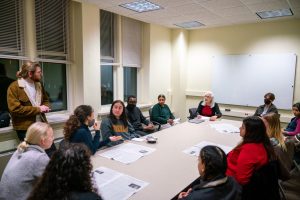Performer Takes Risks with Social-Reformist Spoken Word at Cat
March 16, 2012
Award-winning poet, actor and playwright Carlos Andrés Gómez performed a spoken word poetry production at Oberlin’s Cat in the Cream on March 12. Entering center stage, Gómez immediately captivated the crowd with his honesty and raw emotionality and kept them engaged throughout the show with his wit, passion and charisma. With his questions, stories and satirical commentary on our modern culture, Gómez succeeded in eliciting a radical reaction from the audience. Gómez began as a social worker for disabled children in the Bronx and Central Harlem, and through his work as an HIV/AIDS advocate he raised $40,000 for the cause. As a poet, Gómez has continued his involvement in these causes, using them as the building blocks for his artistic work.
The poems Gómez presented on Monday addressed issues of gender, race, culture, homophobia and wealth, all topics with which most Oberlin students have contended either in theory or outside the classroom. Beginning each poem with an anecdote from his own life, Gómez immediately established a personal rapport with the audience. Although his poetry dealt with overarching social and cultural issues, Gómez punctuated these impersonal concepts with poignant, emotional narratives from his own life.
Gómez performed a total of 11 poems, all of which dealt with extreme conditions of horror and beauty in relation to culture, time, race, class and gender. He opened with a poem about love, using this already loaded word as a catalyst to facilitate his subsequent statement about empowerment. “You have a choice,” Gómez said when describing the proverbial moment of decision at the beginning of any powerful romance. “You can either be selfish and experience this moment by yourself, or you can slide across the room and save the world together,” he continued, concluding, “as long as we have music in our bones, we can never be stopped from dancing.”
Gómez’s poems are about the honest feeling that comes with any experience. He contended, “If you believe what you are saying and are able to be authentic and your best in everything you do, that’s when things start to happen.”
An outspoken advocate for social reform, Gómez carries his passion for social work into his poetry, ultimately using this expressive medium as a vehicle to further his commitment to the issues about which he is most passionate. He referenced the students he has worked with in a number of poems, giving a particularly powerful prelude to a poem that he dedicates to the 10 or so middle school girls in his creative writing class. “Girls are vicious in middle school,” he said. “They’re all about ‘boobs or no boobs,’ ‘small boobs or large boobs.’” Gómez recounts, “I had each child write down 24 things that each thought made them distinctly beautiful.” In his classes, he advocates for female empowerment and improving self-esteem in young girls, maintaining a direct connection between his experiences with his students and the content of his poems.
Gómez is determined to take risks in his spoken word productions. He transcends cultural and political boundaries with his honest, relentless passion for the cause. He said, “I say what I know I shouldn’t say, but I write what is.”
Toward the end of the performance, Gómez presented one of his most controversial, albeit prophetic poems, titled “Invisible Men,” which was written long before there was a general understanding of the “one percentile.” In the poem, he exacts a critique on what can generally be thought of as corporate America, condemning figures such as 50 Cent as “overpaid, pampered celebrities.” Near the end, he delivered a powerful line: “History doesn’t pay; it shows.”
Gómez ended with what was arguably his most mind-blowing poem about genocide in our current culture. The poem, he explained, was inspired by one of his students who asked what genocide was, and “it was written to make sure she didn’t ever forget it.” Satirically, he references schools that “don’t allow [their] students to talk about the word ‘fuck’ when a third of its middle-school class is pregnant.” He left the audience speechless with the ending of his final poem, “What is genocide? This right here, all of this is genocide.”

























